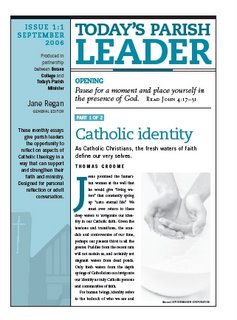I had to sign my name the other day on one of those electronic card readers. My name was illegible even by my standards. There’s something about the angle and feel of those screens and non-pen pens that makes signing your name an act of faith.
Staring at my receipt, trying to imagine how the clerk, who reminded me of my mother, could let me get away with such lousy penmanship, I remembered a little girl from a parish I used to work in. We were celebrating the rite of sending for election, and she was a candidate for baptism that year. The other catechumens each came forward and signed their name. When it was Rosita’s turn, we had to pull the Book of the Elect (which was bigger than she was) off the table and hold it low for her to reach.
Later that day, she sat in the cathedral with the other catechumens waiting for the Rite of Election to begin. One of the ushers began to chat with her and asked her how her day was going. “I wrote my name in a big book!” she told him.
“Really?” he answered. “And are you are getting baptized at the Easter Vigil?”
It was the first time I had ever seen her so quiet. Her body tensed up. She took a deep breath, raised her shoulders up and down, and stared down at her hands. I realized she was scared to death of what lay ahead of her. I wanted to comfort her, or I wanted her parents to, or somebody to just do something so this usually bubbly child would not be so afraid. But then I wondered what any of us would say to her. Hadn’t we asked her to put her name on the line? Hadn’t we asked her—urged her—to embrace the cross?
The liturgy began, and eventually the bishop would ask us, the community of faith, if we were willing put our own names on the line by supporting Rosita and the other catechumens.
Of course we would, wouldn’t we? But I was thinking it over. I was thinking about Rosita and what this decision would cost her, what she would have to die to. Sure, I believe St. Paul and the baptism-into-his-death-so-that-we’ll-have-eternal-life story. Really I do. But it’s never just that simple and easy. That “death” clause is for real. Could I really ask Rosita to just sign up for all this on some big act of faith? Most days, I have trouble living up to what I signed up for myself.
Moment of truth time. The bishop looked out at the assembly. “And now I speak to you, my brothers and sisters.”
He wanted to know if we were ready to support the catechumens. If we were ready to be there for them. If we were ready to teach them how to die to themselves and live for Christ. If we were ready to do what we signed up for.
I could have bailed. I could have said nothing. No one would know. Or I could have just mouthed the words. It’s just words, right. It’s not like Rosita is ever going to actually knock on my door and ask for my help. Will she?
“WE ARE,” we all thundered. I am. I will. That’s something I can put my name to.
Labels: Editor Notes, TodaysParishMinister






